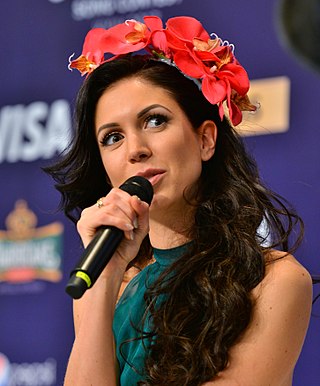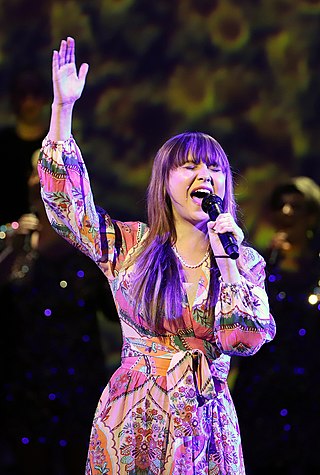Related Research Articles

Laura Põldvere sometimes known professionally as simply Laura, is an Estonian singer. She is said to be the most played Estonian artist on Estonian radio in the past decade. She is internationally known for representing Estonia in the Eurovision Song Contest 2005 as part of the girl group Suntribe and did so again in 2017 in a duet with Koit Toome, singing "Verona."

Sandra Nurmsalu is an Estonian singer, songwriter, and violinist. Recognized within Estonia for her genre-bending style, Nurmsalu has garnered success as both the lead singer of Urban Symphony and as a solo artist.
Eesti Laul is an annual music competition organised by Estonian public broadcaster Eesti Rahvusringhääling (ERR). It determines its entry for the Eurovision Song Contest, and has been staged every year since 2009. Eesti Laul was introduced in 2009, replacing the former Eurolaul festival which had been used since Estonia's first Eurovision participation in 1993. It is one of the most popular television programmes in Estonia; it is also broadcast on radio and the Internet. In 2012, the semi-finals averaged 199,000 viewers, and over an estimated 296,000 viewers watched the final.

Malcolm Lincoln was an Estonian band that formed in October 2009. The members are Robin Juhkental, Jakob Juhkam, Siim Raidma, Ott Adamson, Johan Alexander Petti and Hans Kurvits. The original lineup consisted of Robin Juhkental (vocals/electronics) and Madis Kubu (bass). Juhkental has described their style as "electronic pop with a slightly quirky undertone". The band's name originates from the game show Who Wants to Be a Millionaire?, where a woman incorrectly answered "Malcolm Lincoln" to a question involving the first name of Abraham Lincoln, the 16th President of the United States. Malcolm Lincoln, together with a group of backing vocalists called Manpower 4, won the competition Eesti Laul 2010 with the song "Siren" and represented Estonia in the Eurovision Song Contest 2010. The band released their debut album Loaded With Zoul in May 2010.
Estonia participated in the Eurovision Song Contest 2011 with the song "Rockefeller Street" written by Sven Lõhmus. The song was performed by Getter Jaani. The Estonian broadcaster Eesti Rahvusringhääling (ERR) organised the national final Eesti Laul 2011 in order to select the Estonian entry for the 2011 contest in Düsseldorf, Germany. The national final consisted of three shows: two semi-finals and a final. Ten songs competed in each semi-final and the top five from each semi-final as determined by a jury panel and public vote qualified to the final. In the final, the winner was selected over two rounds of voting. In the first round, a jury panel and a public vote selected the top two to qualify to the superfinal. In the superfinal, "Rockefeller Street" performed by Getter Jaani was selected as the winner entirely by a public vote.

Tatjana Mihhailova-Saar, better known as Tanja or Tanja Mihhailova is a Russian-Estonian pop singer and actress. She was born in Kaliningrad, Russia, and has lived in Estonia from a very young age. Tanja has been a member of several bands in her professional career and has performed in several stage musicals. She represented Estonia in the Eurovision Song Contest 2014 with the song "Amazing" and finished in 12th place in the semi-final, failing to qualify.

Ewert and The Two Dragons is an Estonian indie-rock band. The line-up consists of vocalist Ewert Sundja, guitarist Erki Pärnoja, drummer Kristjan Kallas, and bassist Ivo Etti. Their debut album The Hills Behind The Hills was released in 2009. The follow-up Good Man Down was recorded at the beginning of 2011 and was released in April on I Love You Records. The group's third album, Circles, was released in 2015 on Sire Records. They have gained recognition in the Baltic states as well as in several other European countries.

Iiris Vesik, better known as simply Iiris, is an Estonian singer, songwriter, and stage actress. Her debut album The Magic Gift Box was released in March 2012 under EMI Music Finland. She's also the singer of the group Night Tapes.
Estonia participated in the Eurovision Song Contest 2017 with the song "Verona" written by Sven Lõhmus. The song was performed by Koit Toome, who had previously represented Estonia in the Eurovision Song Contest in 1998 where he placed twelfth with the song "Mere lapsed", and Laura, who had previously represented Estonia in the Eurovision Song Contest in 2005 as part of the group Suntribe where she failed to qualify to the final with the song "Let's Get Loud". The Estonian broadcaster Eesti Rahvusringhääling (ERR) organised the national final Eesti Laul 2017 in order to select the Estonian entry for the 2017 contest in Kyiv, Ukraine. The national final consisted of three shows: two semi-finals and a final. Ten songs competed in each semi-final and five from each semi-final as determined by a jury panel and public vote qualified to the final. In the final, the winner was selected over two rounds of voting. In the first round, a jury panel and a public vote selected the top three to qualify to the super final. In the super final, "Verona" performed by Koit Toome and Laura was selected as the winner entirely by a public vote.
Estonia participated in the Eurovision Song Contest 2018 with the song "La forza" written by Mihkel Mattisen, Timo Vendt, Ksenia Kuchukova and Elina Nechayeva. The song was performed by Elina Nechayeva. The Estonian broadcaster Eesti Rahvusringhääling (ERR) organised the national final Eesti Laul 2018 in order to select the Estonian entry for the 2018 contest in Lisbon, Portugal. The national final consisted of three shows: two semi-finals and a final. Ten songs competed in each semi-final and five from each semi-final as determined by a jury panel and public vote qualified to the final. In the final, the winner was selected over two rounds of voting. In the first round, a jury panel and a public vote selected the top three to qualify to the superfinal. In the superfinal, "La forza" performed by Elina Nechayeva was selected as the winner entirely by a public vote.
Estonia participated in the Eurovision Song Contest 2019 with the song "Storm" written by Stig Rästa, Vallo Kikas, Victor Crone and Fred Krieger. The song was performed by Victor Crone. The Estonian broadcaster Eesti Rahvusringhääling (ERR) organised the national final Eesti Laul2019 in order to select the Estonian entry for the 2019 contest in Tel Aviv, Israel. The national final consisted of three shows: two semi-finals and a final. Twelve songs competed in each semi-final and six from each semi-final as determined by a jury panel and public vote qualified to the final. In the final, the winner was selected over two rounds of voting. In the first round, a jury panel and a public vote selected the top three to qualify to the superfinal. In the superfinal, "Storm" performed by Victor Crone was selected as the winner entirely by a public vote.
Estonia originally planned to participate in the Eurovision Song Contest 2020 with the song "What Love Is" written by Uku Suviste and Sharon Vaughn. The song was performed by Uku Suviste. The Estonian broadcaster Eesti Rahvusringhääling (ERR) organised the national final Eesti Laul 2020 in order to select the Estonian entry for the 2020 contest in Rotterdam, Netherlands. The national final consisted of three shows: two semi-finals and a final. Twelve songs competed in each semi-final and six from each semi-final as determined by a jury panel and public vote qualified to the final. In the final, the winner was selected over two rounds of voting. In the first round, a jury panel and a public vote selected the top three to qualify to the superfinal. In the superfinal, "What Love Is" performed by Uku Suviste was selected as the winner entirely by a public vote.
Estonia participated in the Eurovision Song Contest 2021 with the song "The Lucky One" performed by Uku Suviste and written by Suviste himself along with Sharon Vaughn. The Estonian broadcaster Eesti Rahvusringhääling (ERR) organised the national final Eesti Laul 2021 in order to select the Estonian entry for the 2021 contest in Rotterdam, Netherlands. The national final consisted of three shows: two semi-finals and a final. Twelve songs competed in each semi-final and six from each semi-final as determined by a jury panel and public vote qualified to the final. In the final, the winner was selected over two rounds of voting. In the first round, a jury panel and a public vote selected the top three to qualify to the superfinal. In the superfinal, "The Lucky One" performed by Uku Suviste was selected as the winner entirely by a public vote.
Estonia participated in the Eurovision Song Contest 2022 in Turin, Italy, with "Hope" performed by Stefan. The Estonian broadcaster Eesti Rahvusringhääling (ERR) organised the national final Eesti Laul2022 in order to select the Estonian entry for the contest. The national final consisted of seven shows: four quarter-finals, two semi-finals and a final. Ten songs competed in each quarter-final and semi-final and five from each show as determined by a jury panel and public vote qualified to the final. In the final, the winner was selected over two rounds of voting. In the first round, a jury panel and a public vote selected the top three to qualify to the superfinal. In the superfinal, "Hope" performed by Stefan was selected as the winner entirely by a public vote.

"Hope" is a song by Estonian-Armenian singer Stefan Airapetjan. The song represented Estonia in the Eurovision Song Contest 2022 in Turin, Italy after winning Eesti Laul 2022, Estonia's national final.
Estonia participated in the Eurovision Song Contest 2023 in Liverpool, United Kingdom, with "Bridges" performed by Alika. The Estonian broadcaster Eesti Rahvusringhääling (ERR) organised the national final Eesti Laul 2023 in order to select the Estonian entry for the 2023 contest. The national final consisted of three shows: two semi-finals and a final. Ten songs competed in each semi-final and six from each semi-final as determined by a jury panel and public vote qualified to the final alongside two wildcards selected by the public. In the final, the winner was selected over two rounds of voting. In the first round, a jury panel and a public vote selected the top three to qualify to the superfinal. In the superfinal, "Bridges" performed by Alika was selected as the winner entirely by a public vote.

Alika Milova, known mononymously as Alika, is an Estonian singer. She represented Estonia in the Eurovision Song Contest 2023 with the song "Bridges", finishing in eighth place with 168 points.
Grete Kuld is an Estonian singer, actress, and television presenter.
Estonia was represented at the Eurovision Song Contest 2024 with the song "(Nendest) narkootikumidest ei tea me (küll) midagi" performed by 5miinust and Puuluup. The Estonian participating broadcaster Eesti Rahvusringhääling (ERR) organised the national final Eesti Laul2024 in order to select its entry for the contest. The national final consisted of two shows: a semi-final and a final. Fifteen songs competed in the semi-final and five were automatically qualified for the final. A total of five songs qualified from the semi-final: three were determined by a jury panel and public vote and two were selected solely by the public vote. In the final, the winner was selected over two rounds of voting. In the first round, a jury panel and a public vote selected the top three to qualify to the superfinal. In the superfinal, "(Nendest) narkootikumidest ei tea me (küll) midagi" performed by 5miinust and Puuluup was selected as the winner entirely by a public vote.

Jaagup Tuisk is an Estonian singer from Laagri.
References
- ↑ "Eesti Laul 2018 semifinalists" (in Estonian). ERR . Retrieved 7 January 2018.
- ↑ Avelino, Gerry (10 February 2018). "Estonia: Five acts qualify from Eesti Laul Semi-Final 1". eurovoix.com. Eurovoix. Retrieved 11 February 2018.
- ↑ "Winners of the 2018 Estonian Music Awards revealed" (in Estonian). Estonian Music Awards 2018. Archived from the original on 28 January 2018. Retrieved 28 January 2018.